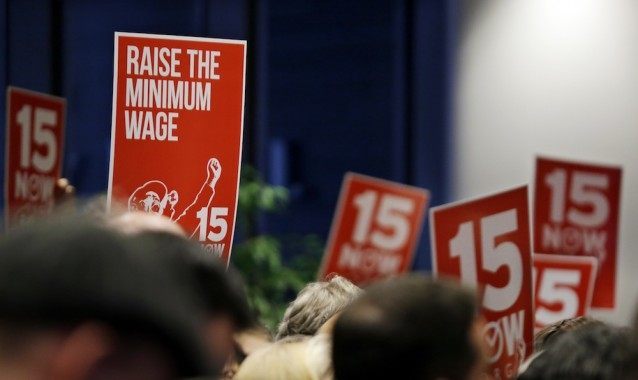A bill proposing a constitutional amendment to establish an increased minimum wage was defeated in the Texas State House on Thursday. The measure failed by a vote of 92-50.
The bill, House Joint Resolution 26, was authored by Texas State House Representative Trey Martinez Fischer (D-San Antonio).
If passed by the Texas Legislature, it would have increased pay to either $10.10 an hour, or the federal minimum wage under the Fair Labor Standards Act (currently $7.25 per hour for non-exempt employees), whichever was higher.
Certain employees would remain exempt from the minimum wage, in accordance with existing law. The wage increase would not have applied to wages paid to patients and clients of certain state health services in compensation for assisting in facility operations or for occupational training. It would also not have applied to certain religious and nonprofit employers.
The Legislature could repeal or limit these exemptions, but could not expand them.
The fiscal note to the House Resolution from the Legislative Budget Board stated that the fiscal implications of an increased minimum wage had not been fully calculated, but the costs associated with such an increase could be quite significant.
The fiscal impact to state government would primarily be associated with employees who work for contracted entities.
Several state agencies were surveyed about the impact of the legislation.
According to the Texas Comptroller of Public Accounts, there were 148,133 state agency employees as of January 2015. Employees who received hourly compensation of less than $10.10 per hour totaled 1,229. Paying these employees $10.10 per hour would cost about $1.6 million per fiscal year, including increased state contributions to the Employee Retirement System.
The cost to higher education agencies was estimated at $2.2 million.
The Texas Department of Transportation (TXDOT) currently pays maintenance workers the federal minimum wage of $7.25 an hour. Raising the minimum rate to $10.10 would have cost $108 million in fiscal year 2016, assuming the effective date of the legislation was September 1, 2015.
The Legislative Budget Board reported that costs associated with the joint resolution, assuming current contracts and practices remained the same, could range from $595 million to $655 million in General Revenue Funds through the biennium ending August 31, 2017.
The cost to local governmental entities would have depended on the current minimum wage of the local government, and the number of employees currently earning a wage below the greater of the federal minimum wage or the new Texas minimum of $10.10 per hour.
Proponents contend that a minimum wage increase would benefit the economy, and the quality of life for Texas workers.
Opponents warn that increasing the minimum wage would result in the loss of jobs and opportunities because businesses would be forced to fire employees, offer fewer hours, or cut benefits.
The proposal would have been presented to voters in the November 3rd election this year.
Lana Shadwick is a contributing writer and legal analyst for Breitbart Texas. Follow her on Twitter @LanaShadwick2

COMMENTS
Please let us know if you're having issues with commenting.